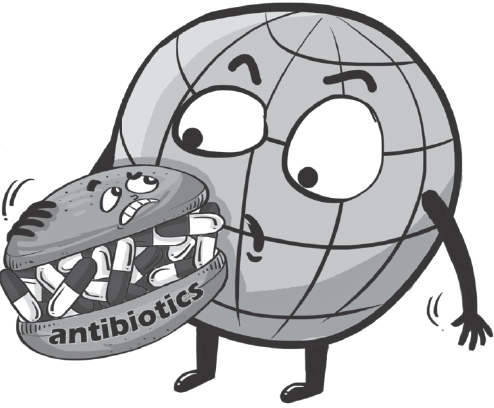
Antibiotics have been our miracle drugs for decades. They have saved millions of lives by curing infections that were once deadly, and have played a key role in making complex surgeries possible. But these medicines are fast losing their power because of widespread overuse and misuse in the human and animal health sectors. This phenomenon-known as antimicrobial resistance or AMR-threatens the health and lives of everyone, the environment, as well as the sustainability of our food and agriculture production systems.
Among humans, misuse is driven by people taking antibiotics when they do not need them; failing to take a full course of antibiotics when prescribed; or not following good hygiene to prevent bacterial infections. All of these actions allow bacteria to survive, to develop resistance to the drugs used to treat them, and to be passed on to others. Worse, these bacteria will become the most resistant to antibiotics and the most difficult to treat. And common surgical procedures such as a caesarean section, or a simple bout of pneumonia could suddenly become life threatening because we can't fight infections with antibiotics or other antimicrobial drugs.
Antibiotics are also misused and overused in farming to treat and prevent infections in animals, to prompt animal growth, and to meet growing global demand for protein-rich food.
Increasing numbers of people in both developed and developing countries are acquiring "superbugs" that do not respond to available treatments. Every year, drug-resistant infections kill an estimated 700,000 people worldwide-most of them in developing countries. Some estimates suggest the number could rise to 10 million by 2050-more than the number of people who currently die from cancer.
Misuse of antibiotics can also exact an enormous financial cost. A recent World Bank Group report says the failure to tackle AMR by 2050 would result in 1.1 percent to 3.8 percent fall in annual global GDP-on par with the impact of the 2008 global financial crisis.
Clearly we have to take action if we care about the future of our families and those of coming generations.
Thankfully we have seen some huge steps taken this year to address this looming global crisis. In August, China issued its National Action Plan to Contain Antimicrobial Resistance. In September, it hosted the G20 meeting in Hangzhou, capital city of East China's Zhejiang province, which committed member countries to address the "threat to public health, growth and global economic stability" posed by AMR. The same month China attended the United Nations General Assembly High-Level meeting on AMR, which further signaled that global leaders recognize the catastrophic consequences of failing to tackle AMR.
The challenge now is to accelerate aggressive actions to control the growth of AMR. But as with many of today's problems, there is no silver bullet.
One of the things we must do is to improve awareness and understanding of AMR, both among those who prescribe and dispense antibiotics, as well as among patients. Another is to reduce the incidence of infection-by getting people serious about washing their hands effectively, especially in hospitals and by reinforcing disease control preventative measures and biosecurity levels in farms.
This week is World Antibiotic Awareness Week, and the global objective this year is to encourage responsible prescription and use of antibiotics. We are joining forces to support the National Health and Family Planning in implementing China's National Action Plan by helping raise awareness of the problem, and to spread greater understanding of the role that everyone-patients, doctors, veterinarians and farmers-can play. Through our activities we hope to build the confidence and knowledge of professionals across human and animal health sectors on the rational prescription and use of antibiotics, and encourage them to be the drivers of behavioral change. We also hope our activities will help the general public understand the importance of hygiene in reducing infection and encouraging responsible demand and use of antibiotics.
Everyone, everywhere can and must do their own bit by taking some simple but very important steps in fighting AMR. We are now standing at a turning point, to which future generations will look and say we made the right choice and acted.
By Bernhard Schwartländer and Vincent Martin
Bernhard Schwartländer is WHO representative in China, and Vincent Martin is FAO Representative in China.


















































